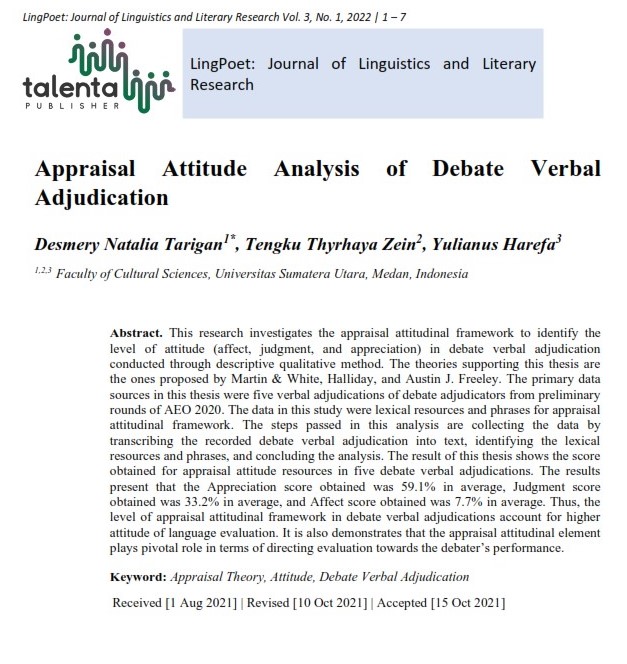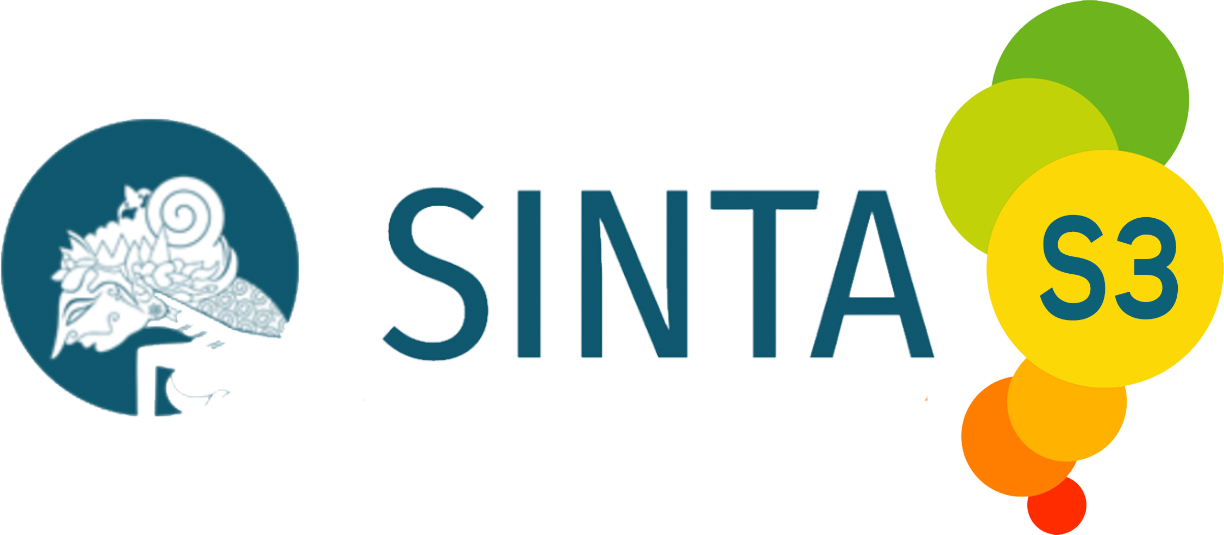Appraisal Attitude Analysis of Debate Verbal Adjudication
DOI:
https://doi.org/10.32734/lingpoet.v3i1.6695Keywords:
Appraisal Theory, Attitude, Debate Verbal AdjudicationAbstract
This research investigates the appraisal attitudinal framework to identify the level of attitude (affect, judgment, and appreciation) in debate verbal adjudication conducted through descriptive qualitative method. The theories supporting this thesis are the ones proposed by Martin & White, Halliday, and Austin J. Freeley. The primary data sources in this thesis were five verbal adjudications of debate adjudicators from preliminary rounds of AEO 2020. The data in this study were lexical resources and phrases for appraisal attitudinal framework. The steps passed in this analysis are collecting the data by transcribing the recorded debate verbal adjudication into text, identifying the lexical resources and phrases, and concluding the analysis. The result of this thesis shows the score obtained for appraisal attitude resources in five debate verbal adjudications. The results present that the Appreciation score obtained was 59.1% in average, Judgment score obtained was 33.2% in average, and Affect score obtained was 7.7% in average. Thus, the level of appraisal attitudinal framework in debate verbal adjudications account for higher attitude of language evaluation. It is also demonstrates that the appraisal attitudinal element plays pivotal role in terms of directing evaluation towards the debater’s performance
Downloads
References
Quinn, S. (2005). Debating (S. Quinn (ed.); first edit, Vol. 1, Issue 9). Brisbane, Queensland. https://doi.org/10.1017/CBO9781107415324.004
Freeley, J. A., & Steinberg, D. L. (1991). Argumentation and Debate: Critical Thinking for Reasoned Decision Making. By Austin J. Freeley. In Argumentation and Advocacy (Vol. 27, Issue 3). https://doi.org/10.1080/00028533.1991.11951518
Su, T. (2016). Positive Discourse Analysis of Xi Jinping’s Speech at the National University of Singapore under Appraisal Theory. Journal of Language Teaching and Research, 7(4), 796. https://doi.org/10.17507/jltr.0704.2
Martin, J. R., & White, P. R. . (2005). The Language of Evaluation. In Canadian Journal for Studies in Discourse and Writing/Rédactologie (FIRST EDIT, Vol. 6, Issue 2). PALGRAVE MACMILLAN. https://doi.org/10.31468/cjsdwr.238
Martin, J. R. (2002). 3. Meaning Beyond the Clause: Sfl Perspectives. Annual Review of Applied Linguistics, 22, 52–74. https://doi.org/10.1017/s026719050200003x
Su, T. (2016). Positive Discourse Analysis of Xi Jinping’s Speech at the National University of Singapore under Appraisal Theory. Journal of Language Teaching and Research, 7(4), 796. https://doi.org/10.17507/jltr.0704.22
OteÃza, T. (2017). The appraisal framework and discourse analysis. The Routledge Handbook of Systemic Functional Linguistics, February, 457–472. https://doi.org/10.4324/9781315413891
Zein, T. T., Sinar, T. S., & Yusuf, M. (2020). Assessing Complexity in the Introduction Part of Bachelor ’ s Theses : A Systemic Functional Linguistic Framework. 12(1), 2100–2111.

Downloads
Published
How to Cite
Issue
Section
License
Copyright (c) 2022 LingPoet: Journal of Linguistics and Literary Research

This work is licensed under a Creative Commons Attribution-ShareAlike 4.0 International License.












